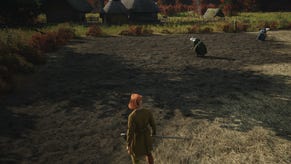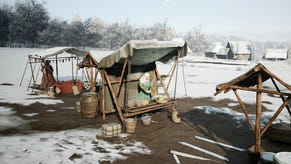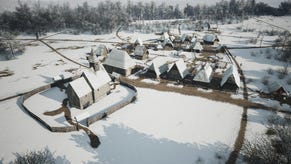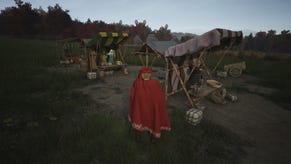16 Manor Lords tips and tricks for beginners
Become the ultimate Manor Lord with our tips for beginners and advanced players alike
Looking for some tips and tricks to help you get started in Manor Lords? It's quite astonishing, what Slavic Magic - predominantly a one-person dev team - has done in creating Manor Lords. The newest city-builder on the block does a whole lot of things rather differently to most games in the genre, with a gridless building and roads system and the inclusion of Total War-style combat being the two features players have talked about the most ahead of release.
But as with many city-builders, it can be difficult to understand exactly what needs doing and when. There's already a lot of content in Manor Lords, even in early access, and not much in the way of tutorials that teach you how everything actually works, or the best strategies to employ to build your settlement from nothing to greatness.
In this guide, we offer 16 (well, actually more like 40) of the best Manor Lords tips and tricks for both beginners and advanced players alike. We'll go over everything from family management and road placement to the different seasons, trade, warfare, and much more. So let's get started!
1. Hold TAB to view extra information
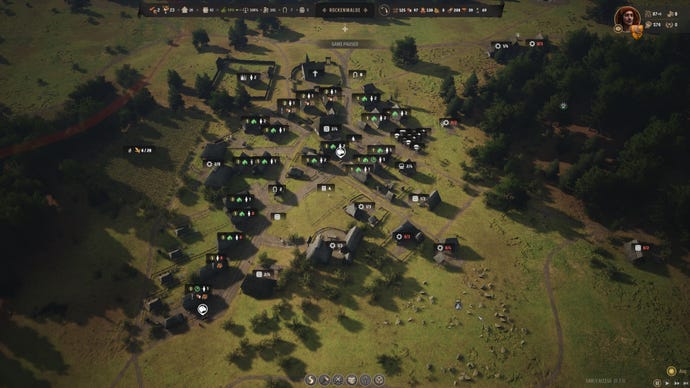
At any point in Manor Lords, you can hold the TAB button to bring up the additional information overlay. This overlay gives you a lot of extra detail at a glance about all the buildings in your settlement, including where your families are working, the current Approval requirements of your citizens, the rate of growth of your crops, and more.
Every couple of minutes I hold TAB and scan my entire settlement to see how everything is doing. It's a fantastic and essential feature that helps you quickly spot any potential issues with your growing town.
2. Unoccupied families will build for you
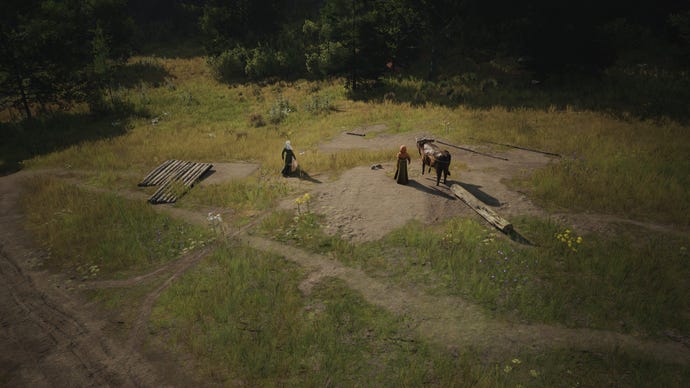
The basic unit in Manor Lords is the family, and you can set families to work in different buildings by clicking on the building and using the plus (+) and minus (-) icons to assign or unassign families. But if you are in the process of building any new buildings anywhere, don't assign all your families to work, because only unassign families will build for you.
You can check how many families are assigned or unassigned to jobs by looking at the first two numbers in the top hotbar. The first icon (next to the hammer) is the number of unassigned families who will carry out any building jobs around your settlement.
3. Store your starting supplies before it rains
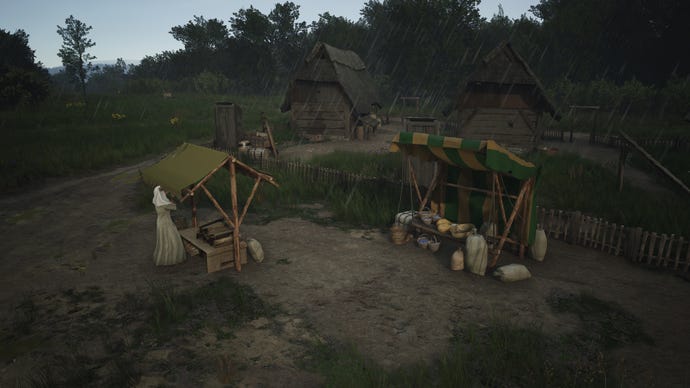
Weather can be deadly in Manor Lords, and rainfall is common. When you first start a Manor Lords playthrough, you need to quickly move your starting supplies into a Storehouse and Granary so they are protected from the next rain.
If you don't do this, then those crucial starting supplies (including your food) could be ruined within the first few days of your playthrough. Make it a priority to store resources that are out in the open as quickly as possible.
4. Take time to understand the seasons
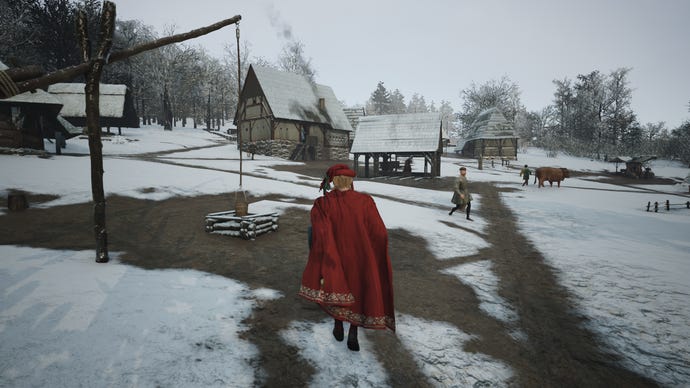
Seasons are very important in Manor Lords. Not only will Winter prove a more difficult survival challenge thanks to double Firewood consumption and the need for Clothes to keep everyone warm, but you also need to synchronise your farming with the different seasons. You should aim to do all your harvesting and sowing during the Autumn months (September, October, November), before leaving them to grow over the Spring and Summer months.
You can hover over the current month displayed in the bottom-right corner of the screen to get a full breakdown of the different seasons and their effects on your settlement in Manor Lords.
5. Optimise road placement
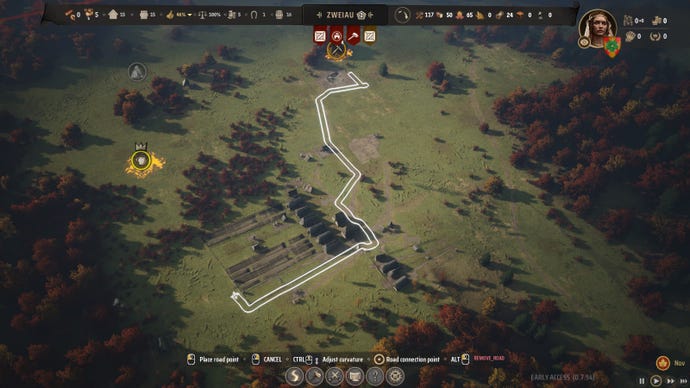
Roads aren't just fun to place in Manor Lords. They make movement much faster for your populace, and so it's important when placing roads to give your citizens the shortest, quickest journey between where they are and where they're going. For example - when beginning a new game, make a conscious decision to build a straight road from your Logging camp to the area you're going to spend most time building, so that your families waste as little time as possible ferrying Timber to and fro.
6. Be very careful with finite resources
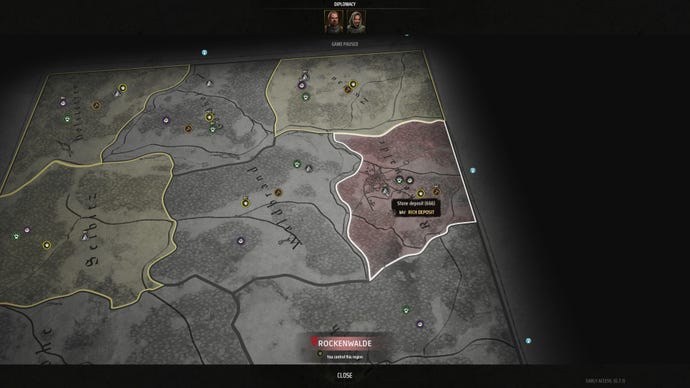
Manor Lords is full of finite resources. Iron and Clay deposits can disappear over time; Berries will only grow at certain times of the year; Wild Animals can be hunted to extinction; even trees and forests are limited resources on the Manor Lords map.
So for each of these resources, you should be very careful not to run yourself out of them entirely. Learn the best ways to prolong these resources. Here's what we suggest:
- Iron and Clay Deposits: Research Deep Mining to turn Rich Deposits into infinite deposits.
- Berries: Research Forest Management to double Berry Deposit capacity.
- Wild Animals: Give your Hunting Camps a Hunting Limit so you don't accidentally kill too many animals.
- Trees: Construct a Forester's Hut to replenish fallen trees around your Logging Camp.
7. Work your families as efficiently as possible
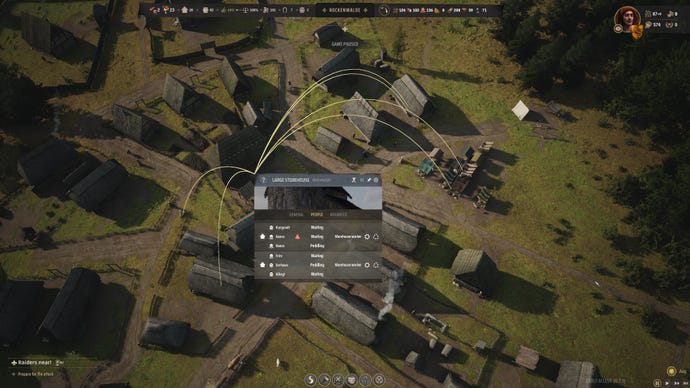
Families do all the important work in Manor Lords, so to really kickstart your settlement, you should try to maximise their efficiency. This tip is actually two tips in one, but both are related and of equal importance:
Make families work close to their homes.
Click on a Burgage Plot and select the "People" tab, then click the "Show Workplace" button with the cog icon. This shows where that family is working. If they work far from home, click the button next to the cog to "Reassign family to a different workplace". If you do this regularly, then your entire Population will become much more efficient because far less working time will be wasted on travel.
Keep changing where your families work depending on need.
If you don't have any construction jobs, then don't leave any families unassigned: set them to work. If your Berries are depleted for now, unassign the families at the Forager Hut. If you don't have Ale, then there's no need for families to work in the Tavern. Move your families around as needed to grow your settlement more quickly.
8. Create Plots with Living Space Extensions
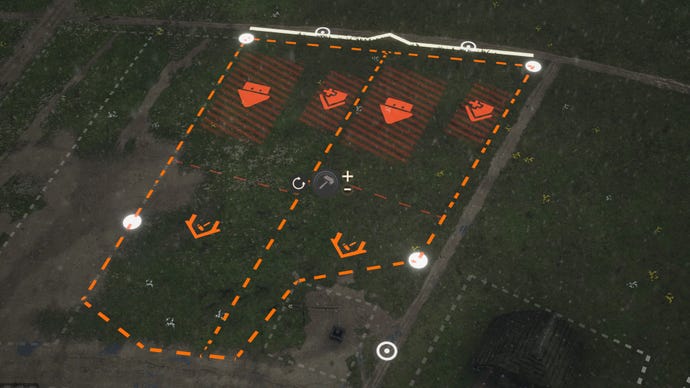
Thanks to the flexible plot system, not all Burgage Plots are created equal. It's a very good idea early on to place down Burgage Plots so that they have Living Space Extensions (the small house with the plus icon). You can get these Plots more easily by reducing the plot divisions before you place down a Burgage Plot.
With a Living Space Extension, you can double the capacity of a single Burgage Plot by selecting it and clicking the "Expand Living Space" button. It costs 2x Timber - the same as creating a new plot - but the benefit is that you only have to upgrade the one plot instead of two. And upgrading is expensive, so prioritising Living Space Extensions will save you lots of resources in the long run.
9. Get another Ox and Hitching Post early on
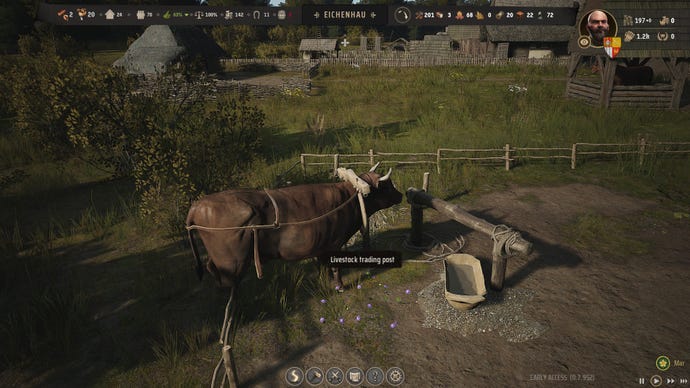
Likely the biggest bottleneck early on in expanding your settlement will be ferrying resources to where they're needed. This is predominantly the job of your Oxen, but with just one Ox and one Hitching Post, you'll never get things done in a timely manner.
Spend the 25x Regional Wealth early on to get an additional Ox, and your productivity will soar. Suddenly buildings will get built so much quicker. It's also a very good idea later on to build additional Hitching Posts and Stables in different areas of your settlement, so that Oxen don't spend ages travelling to where they're needed.
10. Build multiple marketplaces across your town
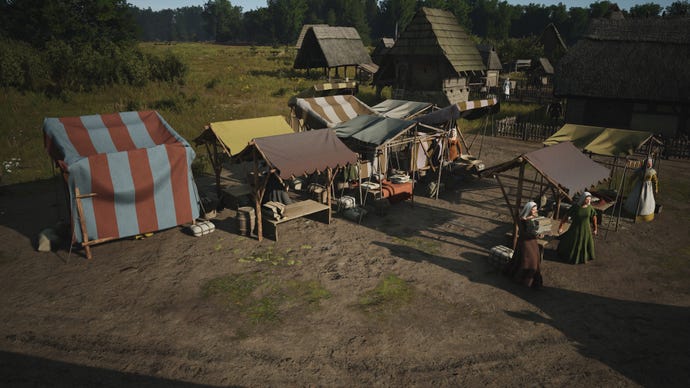
Another efficiency tip that escapes many new players' notice: Marketplaces are essential for the happiness of your families in Manor Lords. Families will themselves set up Market Stalls inside Marketplace areas, but they have to physically travel there in order to sell their wares. Minimise their travel time by creating multiple smaller Marketplaces throughout your settlement, so that every Burgage Plot in the vicinity is near a Marketplace.
11. Set up Trade as soon as you have goods to sell
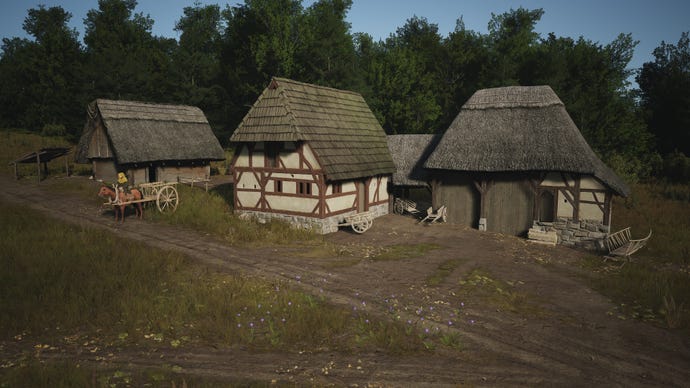
Learning how to trade is an enormous part of any Manor Lords player's first playthrough. To start trading, build a Trading Post and enter the Trade tab of the building to set various resources to be imported and exported.
There's no point in building a Trading Post before you have items to sell, but the instant it feels like you have a good surplus of any item, start exporting. You'll need all that Regional Wealth later when it comes to purchasing weapons and armor, or settling new territories.
12. Export Warbows for big profits
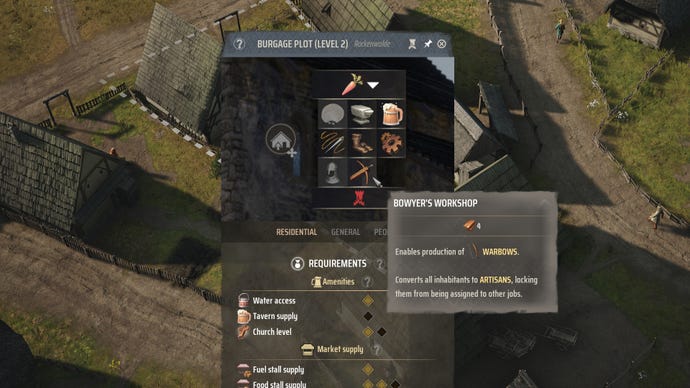
Once you're past the early-game of Manor Lords, by far the best way to get oodles of Regional Wealth is by crafting and exporting Warbows. Each Warbow is made from just 1x Planks, and you can start crafting them as soon as you've got one or two Burgage Plots with Bowyer's Workshops as their Backyard Extensions.
Warbows are amazingly easy to make, and each one sells in the Trading Post for 5x Regional Wealth. For reference: if you just export the 1 Plank it took to make the Warbow, you'd only gain 2x Regional Wealth. That's a 150% markup. Business is good.
13. Start small when farming
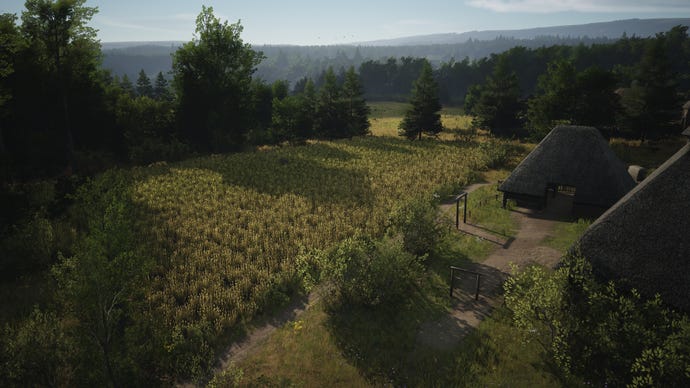
It may be tempting when you first start farming in Manor Lords to just place down one giant farm and say "there, that's all my food needs for the time being sorted". But large farms are very tricky. Everything has to be done in accordance with the seasons, so your workers have a limited amount of time to do every part of the farming process.
Therefore, it's best to start small with your first couple of farms. Farm sizes are measured in "Morgens", and we'd recommend your first farm stays at around 1.0-1.5 Morgens. The bigger farms can come later on.
14. Don't build more than you need
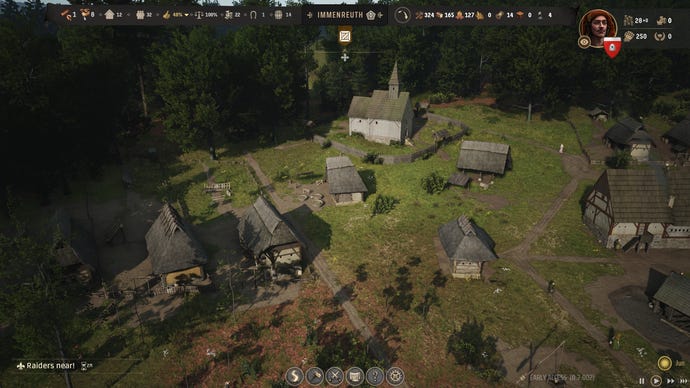
Have you ever stopped to ask yourself why you're building that Malthouse before you've even got Barley? Or why you've got a Sheep Farm before you've imported any Sheep? Most of the buildings in Manor Lords are available to build from the start of the game, which can trick you into thinking you should build them all as soon as possible. You don't.
Building more than you need is a fantastic way to run yourself out of Timber and stall production of your settlement. Play it slow, and build what you need when you need it, and not before.
15. Get the right Development Points early on
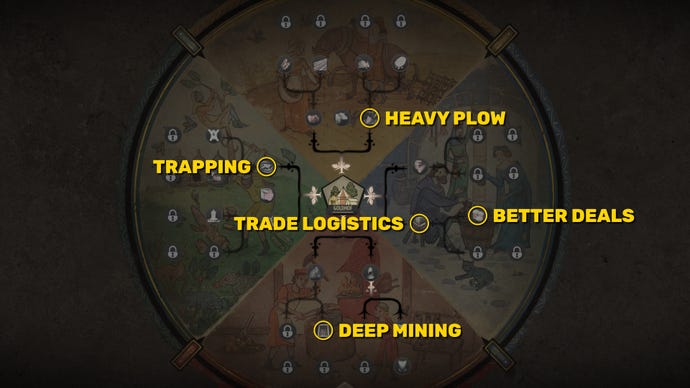
Development Upgrades form the tech tree of Manor Lords, and some of them are very, very powerful. We go over the most important of them in our best Development Upgrades guide, so we won't repeat ourselves here. But remember that, at least when you first start a Manor Lords game, Development Points are rare and precious, and you should invest them where they're most needed. Having an Ox plough a farm sounds cool (and it is), but it might not be your top priority.
16. Deal with Bandits as they arrive
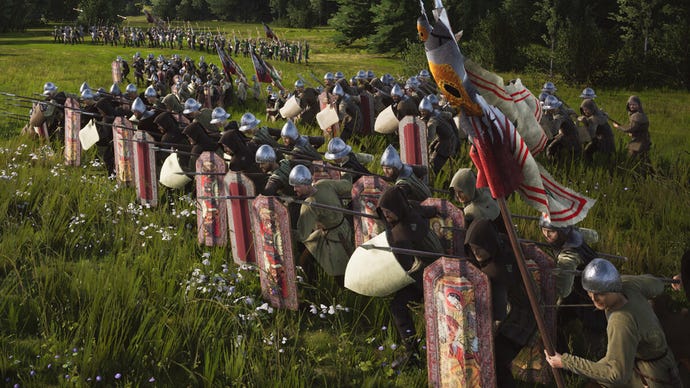
Your first brush with the Total War-esque combat of Manor Lords will likely come into play when Bandits first start appearing on your map. These Bandits should not be left alone to do their thing. The moment the first Bandit Camp appears nearby, you should make it your priority to import whatever equipment you need to raise an army and crush those Bandits without mercy.
Dealing with Bandits as quickly as possible is good for two reasons. First: it is the only way to prevent them from stealing your valuable resources. Banditry happens automatically; there's no stopping it until you destroy the Bandit Camp. And secondly, killing Bandits and plundering their camps is a great way to earn Treasury and Influence.
Bonus Manor Lords tips!
Finally, here's a selection of more specific and advanced Manor Lords tips that we couldn't fit into any of the sections above. How many do you know?
- Select the right starting scenario for your style of play. If you just want a relaxed city-building experience, go with "Rise To Prosperity". For a combat-oriented challenge, pick "On The Edge".
- Food production should always be your top priority, particularly at the start of a new game. Get multiple types of food up and running as quickly as possible, and let that guide your goals for the first few months.
- Demolishing a building refunds the full amount of resources. The only cost is in time taken to rebuild it elsewhere.
- If Wild Animals are quite far away from your starting location, you can chase them closer to your settlement by building in their habitat. Position your buildings so that the deer will run away from it and towards your base. After that you can delete the building for free.
- The Tannery is a good first Industry building to construct, because you'll likely already have a surplus of Hides from the Wild Animals you've been killing (you monster). Turn the Hides into Leather at the Tannery, then sell them at a Trading Post for easy money.
- Firewood isn't made from Timber, it's made from the trees themselves. Build a Woodcutter's Lodge (not a Logging Camp) near some trees and the families working there will chop trees just like with a Logging Camp, but convert the trees into Firewood instead of Timber.
- You can manually set the work area of a building (for example, tell a Logging Camp to only chop trees in a certain location). Do this using the buttons in the "Advanced" tab of the building. You can even hold CTRL and scroll your mouse wheel to increase or decrease the size of the area.
- Don't neglect your Storehouse and Granary. Unlike with most city-builders, you actually need to assign families to these storage buildings in order for them to work. Families working there will also create Market Stalls selling key goods from those buildings.
- Upgrade your Storehouse before it overflows. A basic Storehouse only holds 250 items, while a Large Storehouse holds 2,500 items. So if you start seeing that pesky "Generic Storage Full" alert, you know what to do.
- Use the priority controls when building and farming to tell your Population the most important things to work on.
- You can click the button to the right of your settlement name at the top to switch your resources view between Surplus and Total. Hover over the button to see what this actually means.
- Try to earmark particular Burgage Plots for later Backyard Extensions. Once you upgrade a Burgage Plot to level 2, you'll get a host of more interesting Backyard Extensions such as Blacksmiths for Tools and weapons, Cobblers for shoes, and more. But until then, don't bother with any of the level 1 Extensions for that Burgage Plot, because you'll just be throwing that Regional Wealth away when the time comes to tear it down and create a new Extension.
- Build a Trading Post right on the map border next to a trade area, and you'll get to enjoy a ridiculous rate of import and export. Sneaky!
- Where possible, prioritise hiring Mercenaries over creating an army of your own. Mercenaries may cost a lot of Treasury, but your own armies cost something even dearer: your Population's productivity, and possibly even their lives. While employed in an army, those people are literally taken away from their town, so there'll be lots of jobs in the town going unfulfilled until they return. So if you need to take on a bunch of Raiders, then cough up the dough from your Treasury to employ Mercenaries rather than grinding your town's productivity to a halt.
- If you run out of trees near your Logging Camp, it's best to regrow them rather than demolishing the Logging Camp and building it elsewhere. When demolished, all the Timber will stay where it is as supplies out in the open, and there's a chance they could be ruined by rain.
- Need lots of Influence? The fastest way is fighting, but the easiest way is by raising a Tithe. You can do this at your Manor once you've built one. The Tithe will convert a portion of your surplus food into Influence by sending it to the Church. It's slow going at first, but later on when you have huge amounts of food, that will mean huge amounts of Influence.
- Control sickness with a varied diet. Multiple food sources will boost your Population's immune system. And if they do fall ill, then you can upgrade a Forager Hut to gather Herbs with which to cure them.
- When the time comes to claim your second region of the map, look for resources that are lacking in your first region. If you don't have a good Iron or Clay source, look for a region with one. Similarly, check out the fertility overlay to see what your first region is lacking, and which regions will make up for it.
- Click on the button in the top-right corner next to your portrait to start walking around your settlement in third-person!
- Hit CTRL+C to toggle the cinematic camera in Manor Lords, which will remove the UI and smooth camera movements. Great for screenshots and recording!



